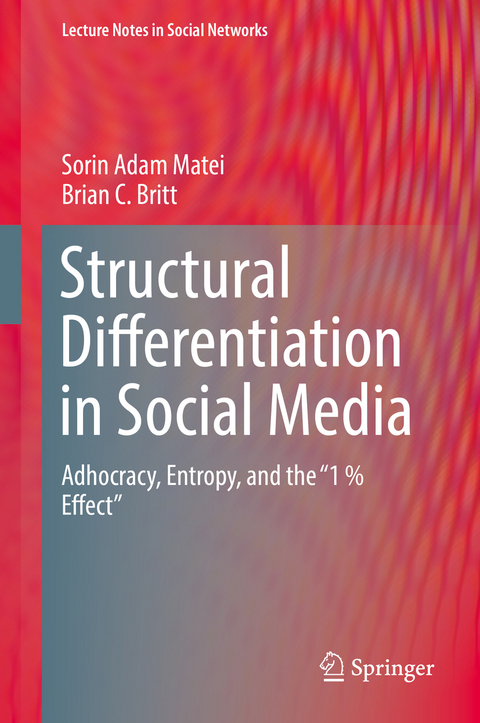
Structural Differentiation in Social Media
Springer International Publishing (Verlag)
978-3-319-64424-0 (ISBN)
This work fundamentally changes the way we think about social media leadership and evolution, emphasizing thecrucial contributions of leadership, of elite social roles, and of group global structure to the overall success and stability of large social media projects. Written in an accessible and direct style, the book will be of interest to academics as well as professionals with an interest in social media and commons-based peer production processes.
Sorin Adam Matei, Professor, Brian Lamb School of Communication, Purdue University, Director of the Data Storytelling Network, Purdue University. Dr. Matei specializes in big data research that investigates the evolution of social media collaborative groups. He is also interested in how social ties and social capital emerging in social media groups generate stable social structures and functional roles. His work was funded by the National Science Foundation and was published in article and book format by the Journal of Communication, Communication Research, American Behavioral Scientist, Springer Nature, and other outlets. Brian C. Britt, Assistant Pro fessor, Department of Journalism and Mass Communication, South Dakota State University. Dr. Britt is a computational social scientist who focuses on the intersection between organizational communication and new media, with a particular emphasis on the strategies employed by individuals positioning themselves in online organizations. His work has been funded by the National Science Foundation and the National Institutes of Health and has resulted in several book chapters in edited volumes.
Introduction.- Part I: Structural Differentiation and Social Media: Theoretical Framework.- Macro-Structural Perspectives on Social Differentiation and Organizational Evolution in Online Groups.- Specifying a Wikipedia-centric Explanatory Model for Online Group Evolution and Structural Differentiation.- Social Structuration Online: Entropy and Social Systems.- Analytic Investigation of a Structural Differentiation Model for Social Media Production Groups.- Part II: Configurational Change Phases and Motors in Online Collaboration.- The Foundations of a Theoretical Model for Organizational Configurations and Change in Online Collaborative Processes.- Organizational Configurations and Configurational Change.- A Synthesized Theoretical Framework for Motors Driving Organizational Configurational Change.- Wikipedia Evolution: Trends and Phases.- Breakpoints and Concurrent Factors.- Part III: Future theoretical and practical directions.- Conclusions.- Appendix A: Data Collection, Management,Pre-Processing, and Analysis.- Appendix B: Historical and Media Analysis of Wikipedia's Evolutionary Context.- Appendix C: Advantages and Disadvantages of Stepwise Segmented Regression Analysis.
| Erscheinungsdatum | 22.09.2017 |
|---|---|
| Reihe/Serie | Lecture Notes in Social Networks |
| Zusatzinfo | XI, 247 p. 33 illus., 32 illus. in color. |
| Verlagsort | Cham |
| Sprache | englisch |
| Maße | 155 x 235 mm |
| Gewicht | 555 g |
| Themenwelt | Informatik ► Datenbanken ► Data Warehouse / Data Mining |
| Schlagworte | Applications of Graph Theory and Complex Networks • behavior of wikipedians • Big Data/Analytics • business mathematics & systems • Business mathematics & systems • commons-based peer production • Communication Studies • Complex analysis, complex variables • Computer Science • Data Mining • data mining and knowledge discovery • evolution of wikipedia • Expert systems / knowledge-based systems • Mathematical Physics • Media Sociology • Media Studies • modeling wikipedian interactions • online community dynamics • Social Media • Social Media Analytics • social media group organization • Sociology • Wikipedia leadership dynamics |
| ISBN-10 | 3-319-64424-6 / 3319644246 |
| ISBN-13 | 978-3-319-64424-0 / 9783319644240 |
| Zustand | Neuware |
| Informationen gemäß Produktsicherheitsverordnung (GPSR) | |
| Haben Sie eine Frage zum Produkt? |
aus dem Bereich


